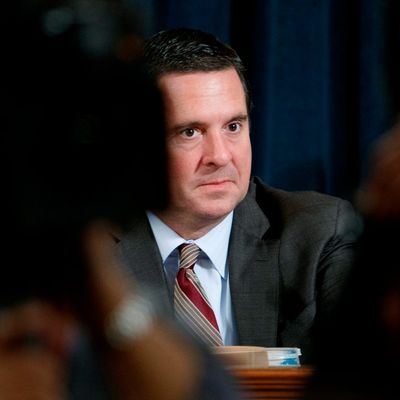
Ambassador to the European Union Gordon Sondland delivered arguably the most interesting and compelling testimony of the Trump impeachment hearings so far. But he also left some facts and conclusions to be ferreted out by members of the House Intelligence Committee. He clearly established a quid pro quo connection between the push for Ukraine to investigate alleged 2016 election interference and the energy company Burisma and a phone call and a meeting between Donald Trump and Ukrainian President Volodymyr Zelensky. He implied (but did not directly testify to) a quid pro quo connection with the hold placed on congressionally appropriated military aid to Ukraine. There was plenty for the ranking Republican on the committee, Devin Nunes, to explore in questioning of Sondland.
Before Sondland’s testimony, however, Nunes made an opening statement that did not even mention the witness or any of the issues he knew Sondland would be asked about. As has been his habit in these hearings, he offered a borderline-unhinged rant about the evil motives of Democrats and their evil foreign co-conspirators in trying to prevent Donald Trump’s election in the first place and then trying to reverse that election via an impeachment “coup.” Here’s a sample of his rhetoric:
Democrats have exploited the Intelligence Committee for political purposes for three years, culminating in these impeachment hearings. In their mania to attack the president, no conspiracy theory is too outlandish for the Democrats.
Time and again, they floated the possibility of some far-fetched malfeasance by Trump, declared the dire need to investigate it, and then suddenly dropped the issue and moved on to their next asinine theory.
When it came time to question Sondland, however, Nunes dwelled exclusively on his own “asinine theories,” which were helpfully unraveled by The Week’s David Faris:
The story goes like this: Corrupt Ukrainians fabricated a “black ledger” implicating former Trump campaign director Paul Manafort in various forms of corruption when he was a key advisor to former Ukrainian president Viktor Yanukovych, a pro-Russian stooge, so that the Trump campaign’s May 2016 hiring of Manafort as campaign manager would look especially suspicious. In this telling, the incident in which Trump campaign staffer George Papadopoulos bragged to an Australian diplomat about how Russia had stolen dirt on Clinton was actually a CIA set-up.
The conspiracy theory then alleges that at the same time, Ukrainian embassy officials were working with a consultant named Alexandra Chalupa (who held a minor post with the DNC) to channel incriminating information about Trump and Manafort to reporters and intelligence agencies. CIA Director John Brennan then supposedly manipulated this information and baited the FBI into opening its investigation. (This is why House Republicans put Chalupa on a list of witnesses they wanted to testify.) The Clinton campaign, meanwhile, was using a firm called Fusion GPS, which paid former British spy Christopher Steele to produce a lurid dossier about Trump. (Though of course it wasn’t released and was only made public by BuzzFeed after the election.) The FBI, supposedly at Brennan’s behest, then improperly used information gleaned from Ukrainians via Chalupa and Steele to trigger its counterintelligence investigation into the Trump campaign.
This entire fantasy has become so familiar in Trumpland that in “questioning” Sondland, Nunes just rattled off references to the “black ledger” and Chalupa and the Steele dossier. The ambassador basically said he knew nothing about any of this lurid stuff. So instead of teasing out weaknesses in the case Intelligence Committee Democrats were building via Sondland’s testimony, the committee’s top Republican couldn’t be bothered with anything other than berating the puzzled (or perhaps bemused — it was hard to tell) ambassador with his claims that everybody has this backward.
Perhaps Nunes couldn’t follow the testimony and simply wanted to return to his usual rant. Or maybe he was articulating the last-ditch GOP defense of Trump if all else fails: that the victimized president was simply trying to expose the horrible (if failed) crime against him committed by Democrats and Ukrainians in 2016. It’s pretty crazy, to be sure, but it does succeed in changing the conversation in ways that credulous Trump supporters will find compelling.






























